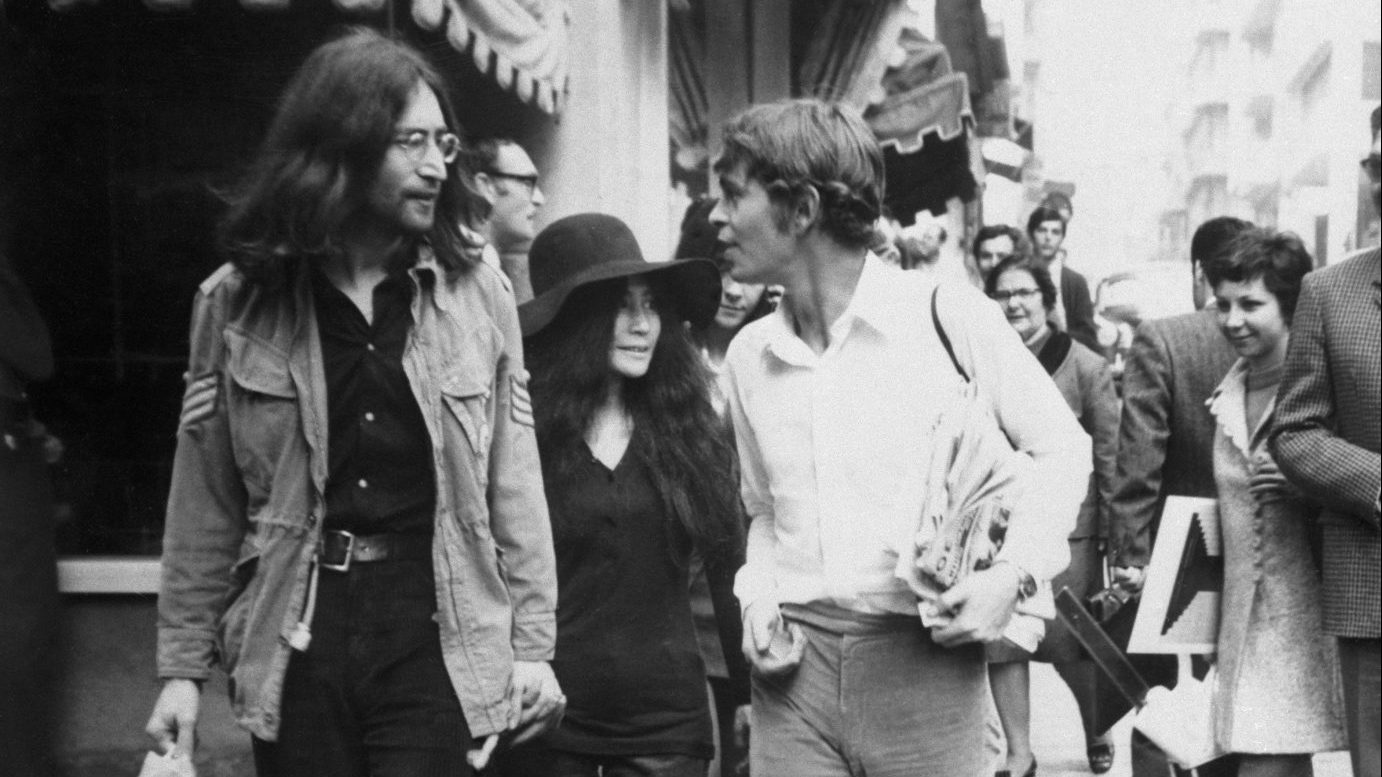A high-frequency signal added to records to prevent them being taped. A
typewriter that automatically transcribes music played near it. Wallpaper that plays music. Paint that changes colour at the flick of a switch. A voice-activated telephone that remembers 100,000 numbers. A tape recorder the size of a cigarette packet with no moving parts. Cars that transform colour with every gear change.
Some of these are great ideas, others are great ideas at 2am after a few
drinks and herbal cigarettes but whose plausibility evaporates with the
sunrise. All of them were developed by, or associated with, the enigmatic
Yannis Alexis Mardas, aka Magic Alex, a television repairman from Athens,
who moved to London in the mid-1960s and found himself heading up The
Beatles’ Apple science division.
To some, he was a visionary genius to be spoken of in the same breath as
Thomas Edison, for others an ingratiating, social-climbing con artist. Either way, Mardas was arguably the most enigmatic figure to orbit the strange world of The Beatles. Which is saying something.
“I remember John coming to my house one day and saying, this is Magic
Alex, my new guru,” recalled Paul McCartney. “I said: ’Oh, OK’.”
Mardas had arrived in London on a student visa in 1965, aged 23, unsure of
what he wanted to be but certain it didn’t involve repairing pensioners’
televisions. London offered a blank slate and endless possibility, a global
city enjoying a creative renaissance where a stranger could bury their past
and become anyone or anything they wanted.
Even today, next to nothing is known of Mardas’ previous life in Greece
except that his father was an officer either in the army or secret police. And
we’ve only his word for that.
Within weeks of arriving, he’d befriended John Dunbar, married at
the time to Marianne Faithfull and owner of the highly regarded Indica
Gallery. So close did Mardas and Dunbar become that when the latter’s
marriage ended in 1966 they shared a flat. Most significantly, through
Faithfull, Mardas had met The Rolling Stones’ Brian Jones and was
commissioned to construct a ’psychedelic light box’ for the band’s
1967 European tour.
The results were less spectacular than the Stones envisaged, but it still
lent enough credibility to Mardas that when he encountered John Lennon at
the gallery, admiring one of his Kinetic Light Sculptures, he introduced
himself and the Beatle was immediately captivated by his enthusiasm and endless stream of ambitious ideas.
Before long, Lennon was introducing Mardas to friends as Magic Alex, The
Electric Guru. “There’s no such thing as a genius,” said Lennon, “but if there
is, he is one.”
When the band announced the opening of the Apple Boutique on
Baker Street in 1967, Mardas promised to mark the occasion by creating an
artificial sun that would turn night into day. At the official opening on 7
December when it was time for it to shine, the London sky remained
stubbornly dark. Stroking his chin, Mardas concluded that central
London’s electricity supply wasn’t powerful enough to fire up the device.
Common-or-garden practicalities outpacing visionary ideas would
become a regular theme of Mardas’ time with The Beatles who, despite
occasional doubts, were convinced that Magic Alex could and would invent
things to change the world — so convinced, that they built him his own
Apple Electronics laboratory at whopping expense: a subterranean lair
where he would work long into the night, white coat flapping as he flitted
from bench to bench, idea to idea, researching, developing, building.
Early in 1968, Mardas was part of the group’s entourage that travelled to
India for a spiritual retreat hosted by the Maharishi Mahesh Yogi. It was
Mardas who took Lennon and George Harrison to one side and told them the
Maharishi had made sexual advances to at least two women, including Mia
Farrow — news that caused the band to cut short their visit.
It’s possible, likely even, that Mardas was envious of the Maharishi’s
increasing influence on the band and invented the claims. Cynthia Lennon
certainly felt that Mardas resented anyone else dominating her husband’s
attention, while, McCartney reportedly said: “It was Magic Alex who made the original accusation and I think that it was completely untrue.”
Back in England, Lennon met Yoko Ono and sent Mardas to inform his wife he was seeking a divorce. Cynthia was in Italy with her mother and son Julian at the time and was stunned to open the door and find Mardas standing there.
“I’ve come with a message from John,” he said. “He is going to divorce
you, take Julian away from you and send you back to Hoylake.”
Returning to London and sensing his influence on The Beatles diminishing,
Mardas sought to re-establish himself by announcing plans to build the
world’s greatest recording studio, a facility with an unprecedented 72-track
mixing desk, surround sound and a force field around each member of the
group in the studio to negate the need for baffle boards.
In January 1969, however, when the band hoped to start work on the Get
Back sessions they found the studio a shambles. No soundproofing, no
talkback facility between the sound room and the mixing desk and no tape
machine.
“It was a 16-track system and he had 16 tiny little speakers all around the
walls,” said George Harrison. “You only need two speakers for stereo sound. It was awful. The whole thing was a disaster and had to be ripped out.”
Studio engineer Dave Harries recalled: “The mixing console was
made of bits of wood and an old oscilloscope, it looked like the control
panel of a B-52 bomber.
“They actually tried a session on this desk, they did a take, but when they
played back the tape it was all hum and hiss. Terrible. The Beatles walked out, that was the end of it.”
The curtain was being pulled back, it seemed, to reveal the magic of Magic
Alex as anything but. Soon afterwards, Allen Klein arrived as business
manager seeking to unpick The Beatles’ chronically complicated finances and one of his first actions was to close down Apple Electronics and send
Magic Alex on his way.
Mardas popped up again briefly in 1977, claiming to have invented a new
kind of bullet-proofing for cars. He attracted the interest of the Sultan of
Oman, for whom a demonstration was arranged to secure an order of 450
bulletproof luxury Mercedes. When Omani soldiers opened up with
machine guns, however, bullets ruptured an air cylinder and blew the
vehicle to smithereens.
Was Magic Alex a genius, a charlatan or just a dreamer out of his depth? John
Lennon, who knew him better than most and demonstrated the greater
faith in his alleged talents, perhaps summed him up best.
“He was just another guy who comes and goes around people like us,” he
said. “He’s all right, Alex, but he’s cracked. He means well.”




